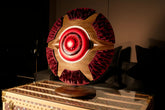About the Origins

Tobacco, the key ingredient in cigars, was introduced to cuba by the indigenous people. However, history does not indicate when Cuba's first tobacco crop was harvested, but we do know that the Spanish colonisers recognised its potential and began growing it on an enormous scale.
According to legends, while crossing the Atlantic Ocean, Christopher Columbus and his crew had unusual experiences on the island of Hispaniola (now claimed by Haiti and the Dominican Republic) and in Cuba. They encountered folks smoking an unusual blend of herbs wrapped in banana or palm leaves. Later, when Columbus and his crew arrived in Cuba, the island's Taino Indians introduced him to their indigenous cigar recipe, which consisted of a few dried, rolled tobacco leaves. The first Cuban cigar prototype thus made its initial appearance in the West. Spain and Portugal were its initial European home.
The Spanish
The history of Cuban cigars is also a tale of struggle , influence and power. By the 16th century, the Spanish built the first cigar factory, then planting cigar started to become the north American commercialization. As the result, tobacco cultivation had firmly taken root in Cuba, and the practice of smoking cigar gained popularity.
The Spanish government was the first to impose a monopoly on the Cuban cigar trade. In 1717, it even passed a law giving it exclusive ownership of everything to do with tobacco and its by-product.
Later, the Seven years’ War of 1762, which favoured the English, allowed them to seize possession of Havana by a variety of tactics. The English took Havana and returned it to Spain in exchange for Florida. Throughout the occupation, the tobacco trade was granted complete freedom and quickly prospered.
By the time the peace treaty reestablishing the Spanish enclave on the island was concluded, Cuban tobacco and cigars were already being sold to all parts of the world, piquing the attention and enthusiasm of many.
The first cigar factory in the United States began in 1810, and tobacco plants spread across the country. However, it wasn't until the end of the American Civil War that cigars truly acquired popularity and became an emblem of societal achievement.
The Golden Age
Cuban cigars began to gain international recognition in the 19th century. Their reputation soared, especially in Europe, where they became a favorite indulgence of royalty, aristocrats, and the upper class. The exquisite quality and distinct flavors of Cuban tobacco, attributed to the unique combination of Cuban soil and climate, further enhanced their allure.
The late 19th and early 20th centuries marked the golden age of Cuban cigars. Cuba's fertile lands and skilled craftsmen produced some of the finest cigars in the world. Legendary brands such as Cohiba, Montecristo, and Romeo y Julieta emerged during this era, solidifying Cuba's reputation as the epitome of cigar excellence.
The Challenges and Transformation
The Cuban cigar industry has experienced several problems throughout its existence. Political upheavals, like the Cuban Revolution in the 1950s, led to the nationalisation of the tobacco sector. The United States' following trade embargo in the 1960s had a significant influence on the global distribution of Cuban cigars.
Despite challenges, Cuban cigars are still adored by connoisseurs worldwide. The rigorous process of hand-rolling each cigar, which is frequently performed by highly talented torcedores, exemplifies the creativity and passion required to create these beauties. The unique flavours and fragrances associated with Cuban tobacco have become an intrinsic element of cigar culture.
The history of Cuban cigars is a fascinating tale of tradition, artistry, and perseverance. Cuban cigars have made a distinct influence on the tobacco world, beginning in indigenous Cuba and rising to become a global emblem of luxury. While the business has encountered problems throughout the years, the tradition of Cuban cigars continues to captivate lovers with their unsurpassed quality and timeless charm.












